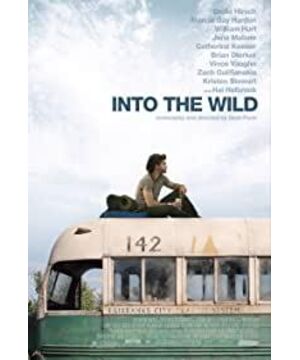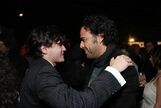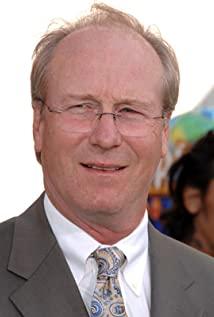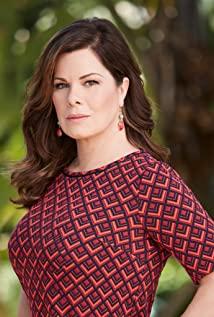Maybe it's a good thing for me, but I think the facts are very important-if you are not simply discussing the art of film itself.
1. Chris did not die by eating poisonous fruit, but starved to death.
2. He did not write down the words "Happiness is to be shared" when he died.
The last word written in Chris' diary is: "Beautiful Bluberries."
And his official last words are: I have a very happy life, thank the Lord. Farewell, God bless!
(I HAVE HAD A HAPPY LIFE AND THANK THE LORD. GOODBYE AND MAY GOD BLESS ALL!)
Those so-called "going home" hallucinations, so-called emotions such as "confession" or "Great Enlightenment" do not belong to Chris, they are strong by the screenwriter. Added to him (or given to this role).
Chris's lone life and death were events of social concern in the United States at the time: a young man who should have escaped from social life in the wild, but starved to death in Denali National Park five months later.
It can be said that the movie uses the final words to comfort those who want to leave but dare not leave.
It seems embarrassed to tell this society that is as good as a sheep: the rebellious son who died early lived very happily and has no remorse.
In the end, it just took the lamb to appreciate the great rivers and mountains of America, and told them to cherish the smooth and ordinary life now—seeing that the wolf finally wanted to be a sheep.
--------------Documentary of McCandless's death ---------------
From:http://en.wikipedia.org/wiki/Christopher_McCandless
does not translate well, it is just for lazy
people :) If you are an English expert, please ignore Xiaobai's translation and just look at the original text.
On August 12th, McCandless left his final handwriting in his diary: "Beautiful Bluberries."
He tore off the last page of "Education of Wandering Man (Autobiography of Louis L'Amour)". An excerpt from a poem by Robinson Jeffers: Wise Men in Their Bad Hours:
Death's a fierce meadowlark: but to die having made
Something more equal to centuries
Than muscle and bone, is mostly to shed weakness.
The mountains are dead stone, the people
Admire or hate their stature, their insolent quietness,
The mountains are not softened or troubled
And a few dead men's thoughts have the same temper.
On the opposite side McCandless wrote: I have a very happy life, thank the Lord. Farewell, God bless!
On September 6, 1992, two hikers and a team of deer hunters found this line on the bus (where McCandless last lived):
"SOS I need help. I am injured and dying. I am alone, very weak and unable to get out of the wilderness. I swear in the name of God, this is not a prank. Please stay and give me help. I will gather berries nearby. At night Will be back. Thank you. Chris McCandless, in August (?)"
His body was found in a sleeping bag in the bus. It was estimated that (at the time of death) he weighed only 67 pounds. The time of death was about two weeks ago, and the official cause of death was: starvation.
(For McCandless) biographer Jon Krakauer proposed two other causes of McCandless's death. The wasting of the remains was caused by McCandless's daily adventure hunting and little gains during his lifetime. Krakauer insisted that the cause of death in McCandless's state of death was never starvation.
Initially, Krakauer claimed that McCandless might have died from eating poisonous fruits (Hedysarum alpinum), but multiple autopsy reports proved that there were no residual toxins in the body. So in the second printed version of (McCandless Biography), he speculated that McCandless died from eating a poisonous fungus (Rhizoctonia leguminosa). Of course, Krakauer's speculation is without evidence, and all the causes of death recorded in court records are "starved to death".
Others who disagree with McCandless's risk-taking behavior and excessive arrogance speculate that the cause of his death may be a mental illness: bipolar disorder or schizophrenia.
-----
Translator Random Entry:
This biographer probably thinks that the "starved to death" cause of death is very disgraceful and will make his biography unsellable, right?
So strenuously creating a dramatic cause of death to make Christ a tragic Greek hero?
-----The following is the original English-----
On August 12, McCandless wrote what are assumed to be his final words in his journal: "Beautiful Blueberries." He tore the final page from Louis L'Amour's memoir, Education of a Wandering Man, which contains an excerpt from a Robinson Jeffers poem entitled "Wise Men in Their Bad Hours":
Death's a fierce meadowlark: but to die having made
Something more equal to centuries
Than muscle and bone, is mostly to shed weakness.
The mountains are dead stone, the people
Admire or hate their stature, their insolent quietness,
The mountains are not softened or troubled
And a few dead men's thoughts have the same temper.
On the other side of the page, McCandless added, "I HAVE HAD A HAPPY LIFE AND THANK THE LORD.GOODBYE AND MAY GOD BLESS ALL!"
On September 6, 1992, two hikers and a group of moose hunters found this note on the door of the bus:
"SOS I need your help. I am injured, near death, and too weak to hike out of here. I am all alone, this is no joke. In the name of God, please remain to save me. I am out collecting berries close by and shall return this evening. Thank you, Chris McCandless. August?"[1]
His body was found in his sleeping bag inside the bus, weighing an estimated sixty-seven pounds. He had been dead for more than two weeks. His official cause of death was starvation.
Biographer Jon Krakauer suggests two factors may have contributed to McCandless's death. First, he was running the risk of starvation due to increased activity, compared with the leanness of the game he was hunting. [4] However, Krakauer insists starvation was not, as McCandless' death certificate states, the primary cause of death. Initially, Krakauer claimed McCandless might have ingested toxic seeds (Hedysarum alpinum). However, extensive laboratory testing proves conclusively there was no alkaloid toxin present in McCandless' food supplies. In later editions of the book, therefore, Krakauer has speculated a fungus Rhizoctonia leguminicola, which may have increased the toxicity, could have grown on the seeds McCandless ate. However, there remains no evidence to support Krakauer's theory, and all forensic data suggest starvation.
Others have speculated that McCandless' risk-taking and overconfident behavior which led to his death stemmed from an untreated mental illness, such as bipolar disorder or schizophrenia.[5]
------Reproduced a translation: Christopher Johnson McCandless's life Introduction-------
http://guangfeiliu.spaces.live.com/Blog/cns!62DC2DBFD9A4D3EE!1497.entry
Christopher Johnson McCandless (1968.2.12-1992.8.18)
grew up in Annandale, Virginia, father Walt McCandless is an antenna expert working for NASA. His mother, Wihelmina Billie Johnson, was the father's secretary at first, and later helped him open a very successful consulting company. Since he was a child, Chris's teacher has discovered that he has extraordinary willpower. As he grew up, he added a strong idealism and physical endurance. When he was in high school, he was the captain of the Inter-County Alliance. He encouraged his teammates to regard running as a kind of mental exercise-"Run to resist the power of darkness, all the evil and hatred in the world."
Chris graduated from WT Woodson High School in 1986 and graduated from Emory University with a major in history and anthropology in 1990. His good background and academic performance conceal his growing contempt for the empty materialism of American society. The works of Jack London, Leo Tolstoy and Henry David Thoreau have a great influence on him. He dreams of leaving the society to live a life of solitary retreat like Thoreau.
After graduating from university, he donated all the 25k$ he saved to Oxfam International, a famous charity organization, and began to travel under the name Alexander Supertramp. He passed through Arizona, California and South Dakota—he worked in a barn there for a while. Chris alternates between living and living alone. Sometimes he does a job and lives in a group in the real world, sometimes he has no money and has little contact with people, and sometimes he finds something to eat in the wild. . He has gone through several adventures, such as losing his car in the flooded concrete stream and rowing a canoe down the Colorado River straight to California Bay. Chris is proud of these minimally equipped adventures and generally doesn't make special preparations.
He has had a dream of going to Alaska for an adventure for many years. Leave the mainland, leave civilized society, and bring a travel log to record your body and mind when facing the forces of nature. In April 1992, he hitchhiked all the way to Fairbanks in Alaska. The last person to see him was James Gallien, who drove Chris from Fairbanks to Stampede Trail. Gallien was especially concerned about Alex, who had little equipment and had no experience in the Alaska Wasteland. He tried to persuade Alex to postpone the trip, and even took him to Anchorage to buy some equipment. But McCandless refused his help and only accepted a pair of rubber boots, two tuna sandwiches and a bag of cotton swabs. After walking the Stampede Trial for a while, he found a bus abandoned by hunters near Denali National Park and started his life alone. He had a bag of 10 pounds of rice, a Remington semi-automatic rifle and a lot of 22LR bullets, a book about local plants, some other books and some camping equipment. He thinks he can survive by collecting plants and hunting. Although he didn't have much hunting experience, he still caught some small animals such as porcupines and birds. Once he successfully hunted a moose, but failed to preserve the remaining meat. Local people usually cut the meat into thin strips and then dry it, but he tried to smoke it following the advice of a hunter friend he met in South Dakota. His travel log recorded a total of 113 days, ranging from happy to sad. In July, he had been successfully living on the bus for several months. When he was about to leave, he found that the road was no longer due to the rising water of the Teklanika River.
On September 6, 1992, two hikers and a group of moose hunters found the following note on the bus door
"SOS I need your help. I am injured, near death, and too weak to hike out of here. I am all alone, this is no joke. In the name of God, please remain to save me. I am out collecting berries close by and shall return this evening. Thank you, Chris McCandless. August?"
On August 12, he tore off the last page of Louis L'Amour's memoir, Education of Wandering Man, and wrote the last words
"Death's a fierce meadowlark but to die having made Something more equal to centuries Than muscle and bone, is mostly to shed weakness. The mountains are dead stone, the people Admire or hate their stature, their insolent quietness, The mountains are not softened or troubled And a few dead men's thoughts have the same temper."
On the other side of the paper, he wrote "I HAVE HAD A HAPPY LIFE AND THANK THE LORD. GOODBYE AND MAY GOD BLESS ALL!"
People found his body in a sleeping bag in the bus, leaving only 67 pounds (30 kg). At that time, he had been dead for two weeks, the cause of death-starved to death. The biographer Jon Krakauer suggested that Chris died of poisoning, but the autopsy found no supporting evidence.
Krakauer's book took Chris to a high level, and he became a hero in many people's minds. In 2002, that abandoned bus became a tourist attraction, and many people came here admiringly. Many young people also stepped in his footsteps, flocked to Alaska, and walked his way again.
On the other hand, local residents have a negative view of Chris and the promotion of him. His practice of not carrying even a map is disagreeable, which is tantamount to suicide. You know, 6 miles away from Stampede Trial, there is a manual cable car that can cross the flooded river. And a few miles away from the bus, there is also a small house full of emergency life-saving supplies (although the small house has been destroyed and the supplies have been ruined-it is thought that Chris may have done it).
View more about Into the Wild reviews










